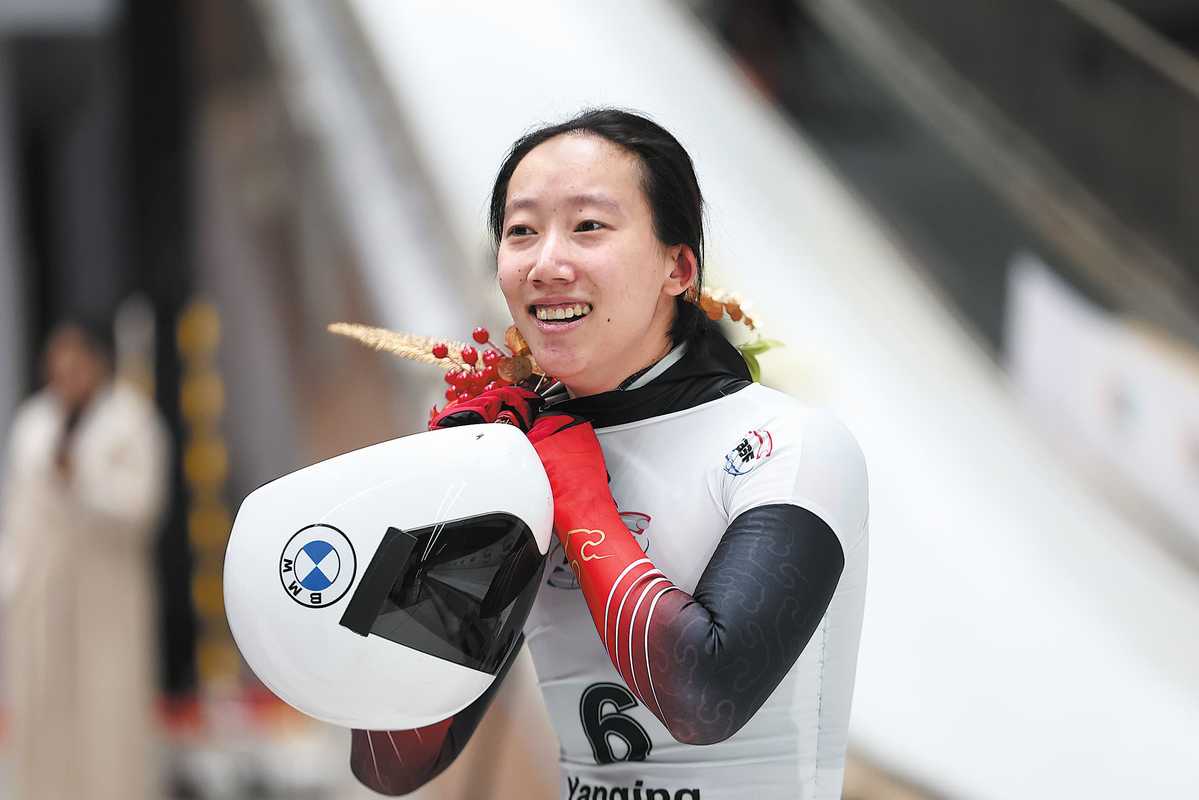
 0 Comment(s)
0 Comment(s) Print
Print E-mail China Daily, November 25, 2024
E-mail China Daily, November 25, 2024
From an obscure triple jump hopeful to history-making skeleton racer, Chinese sledder Zhao Dan has reinvented her career on the back of the fabled "Flying Snow Dragon", winning China's first ever women's gold medal in the sliding discipline on Saturday.
Known as one of the most challenging of its kind, the frozen track at northwest Beijing's National Sliding Center has seen very few sledders, even the world's bravest and most experienced, master its challenging 1.9 kilometers of daunting curves, steep descents and bumpy ramps perfectly since its competition debut at the 2022 Winter Olympics.

China's Zhao Dan celebrates winning the country's first ever women's skeleton gold medal at the National Sliding Center in northwest Beijing's Yanqing district on Saturday. XINHUA
Chinese women's racer Zhao added her name to the short list of "dragon tamers" on Saturday, after she outran a strong field of Olympic medalists to win the country's first ever women's skeleton gold medal at the 2024-25 season's third leg of the World Cup series.
Zhao, who was drafted from the triple jump to join China's newly-built skeleton program prior to Beijing 2022, took advantage of a strong running start, thanks to her years of sprint training in athletics, before navigating through the track's many tricky sections to finish her two runs in a combined time of two minutes and 4.27 seconds and claim the gold in Yanqing.
The reigning Olympic champion Hannah Neise of Germany had to settle with a runner-up finish, trailing Zhao by 0.37s, while Britain's Freya Tarbit, who tied with Zhao after the first run, fell to third place after completing her second run in a total time of 2:04.68.
Hurtling down an icy track, headfirst, on a thin sled that reaches speeds of up to 130km/h is already an intimidating challenge, yet the super difficult, and longer-than-usual, setup of the Yanqing track, which features a first-of-its-kind 360-degree loop section, has made it almost impossible for sledders to stick to their optimal lines.
Zhao, apparently, is one of the few who can, managing to do so successfully for the first time in an official competition, after misreading a curve last year and finishing second at her first Yanqing Cup race.
"I am so satisfied with my results today. Hopefully I can finish more World Cup races on the podium to improve my chances for greater breakthroughs at the 2026 Winter Olympics and beyond," said Zhao, a 21-year-old native of North China's Inner Mongolian autonomous region.
In the later men's race on Saturday, China's home hope Yin Zheng added his fourth World Cup medal after finishing third overall in 2:02:02, following runner-up Matt Weston of Britain (2:01:94) and gold medalist Christopher Grotheer of Germany (2:01:93).
Yin has emerged as China's most promising medal hope for Milan-Cortina 2026 in skeleton, having collected three gold medals from the 2023-24 World Cup season.
Saturday's golden finish has maintained Grotheer's winning streak this season, after the invincible world and Olympic champion opened the 2024-25 campaign with two earlier wins in Pyeongchang, South Korea.
For the host's emerging men's squad, the campaign deserved plenty of cheers, despite no gold medals, after three more racers — Lin Qinwei, Zhu Haifeng and Chen Wenhao — all finished in the topeight, claiming fifth, sixth and seventh places, respectively. It marks a significant collective improvement for Team China.
In the women's race, Team China also qualified four racers in Yanqing to occupy the maximum quota allowed per team at a Cup event.
"Now, we have the medals and the strength in numbers. Gradually, I think we will achieve better results one race at a time," said Zhao.
"Our men's team is also doing extremely well. I am looking forward to their future performances, as well."
A total 62 athletes from 16 countries participated in the season's third World Cup event in Yanqing.
Go to Forum >>0 Comment(s)